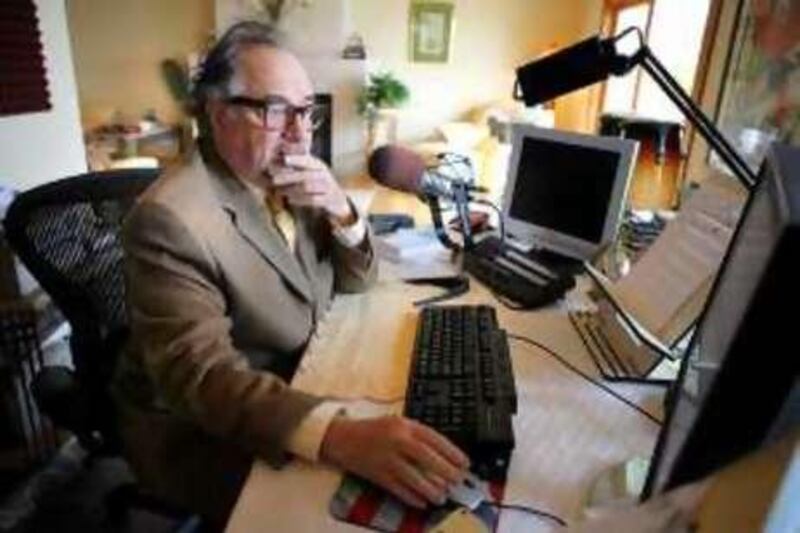ABU DHABI // Offensive comments about autism sufferers by an American talk show host last week have caused shock among parents and some educators of autistic children in the UAE. They said his views were ignorant and expressed dismay that he aired them on his popular radio show. Michael Savage called autism an "illness du jour" on his show Savage Nation. "Now you want me to tell you my opinion on autism since I'm not talking about autism ? a fraud, a racket.
"What do you mean they scream and they're silent? They don't have a father around to tell them don't act like a moron, you'll get nowhere in life. Stop acting like a putz. Straighten up! Act like a man! Don't sit there crying and screaming, idiot." He said in 99 per cent of cases of autism "it's a brat who hasn't been told to cut the act out. That's what autism is." Mr Savage's show is one of the most popular radio programmes in the United States, regularly attracting up to 10 million listeners. Autism activists in the Emirates were dismayed that such misinformation was being spread to so many people.
"He's wrong. Autism is not like this," said Mr Almajeed Abu Zaitoon, a special-education teacher at the Abu Dhabi Centre for Autism. "He needs to read about autism. Autism has nothing to do with whether a person has good parents." Mr Zaitoon was shocked that a person with no medical background had spoken out on such a complex subject. "He should not be saying these things to people. He's wrong and he should not speak like this to millions. If he had good information, he could tell 10 million people about autism, he could tell the truth about it."
Mr Zaitoon works with autistic children every day and understands the difficulties involved in supporting them. "They don't know how to explain what they want. They do not have the capacity to explain about their feelings. Many are non-verbal, so they are always upset, screaming, shouting and jumping." He said far from being lazy and uninvolved, most parents of autistic children worked much harder at raising them than they might with healthy children.
Karim Khan, 35, a social worker in Abu Dhabi who has an autistic son, said he was saddened that misconceptions about the disease had become so prevalent. "Autism is a sickness, a disease," he said. "It is a very complicated thing to control an autistic child." Mr Khan and his wife both care for their son, seven, who requires constant supervision and care. "With autistic children, the problem is they don't do things in a normal way. To do things in a normal way they need strict training and control," he said.
He said his son acted up, but said this was not because he was a "brat". "How do we accept that he does wrong? Of course it affects me when he does wrong but he is sick. God has not given him the ability to think. He can't tell the difference between bad and good things." Sarah al Marzooqi, an educational psychologist at the Dubai Autism Centre, said confusion about the disease was widespread in the UAE as well as in the United States. Mr Savage's comments did not surprise her, she said.
"It's not the first time I've seen this kind of reaction towards autism. Even with people in the medical field, people who are doctors or physicians say that. A physician once told me, 'I don't believe in autism'. It is so funny. You wonder where to start with them," Ms Marzooqi said. Part of her surprise stemmed from the fact that the US commits considerable resources to the study and management of autism.
"I thought, if that can happen in America I wouldn't be surprised if it happened here, where we have less. We have limited resources and limited services. Compared to the States, though, it seems we are the same in terms of the level of awareness. "This is evidence that people are still very ignorant about it and there is not enough awareness about autism." Ms Marzooqi said she was disappointed that Mr Savage chose to use his authority in this way, especially with his lack of medical background.
"For him to say autism doesn't exist shows his misconceptions, and people will miss a lot. To think those kids are misbehaving, and to take this sort of attitude, is really unprofessional," she said. However, she believed the net result of his comments had actually been quite positive. "We really shouldn't get angry. If he says autism doesn't exist, then it's great because we can argue that. He put autism on the map again and brought up the attention of the media to autism. It's a good opportunity for us."
She excused Mr Savage's statements as ignorant rather than malicious. "Whatever he is saying is acceptable because he doesn't know, so let's teach him about autism and the misconceptions around it," Ms Marzooqi said. @Email:amcmeans@thenational.ae





